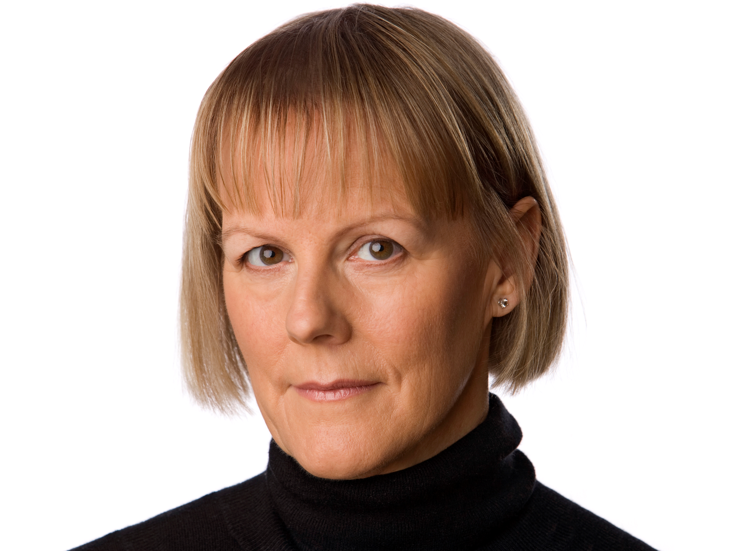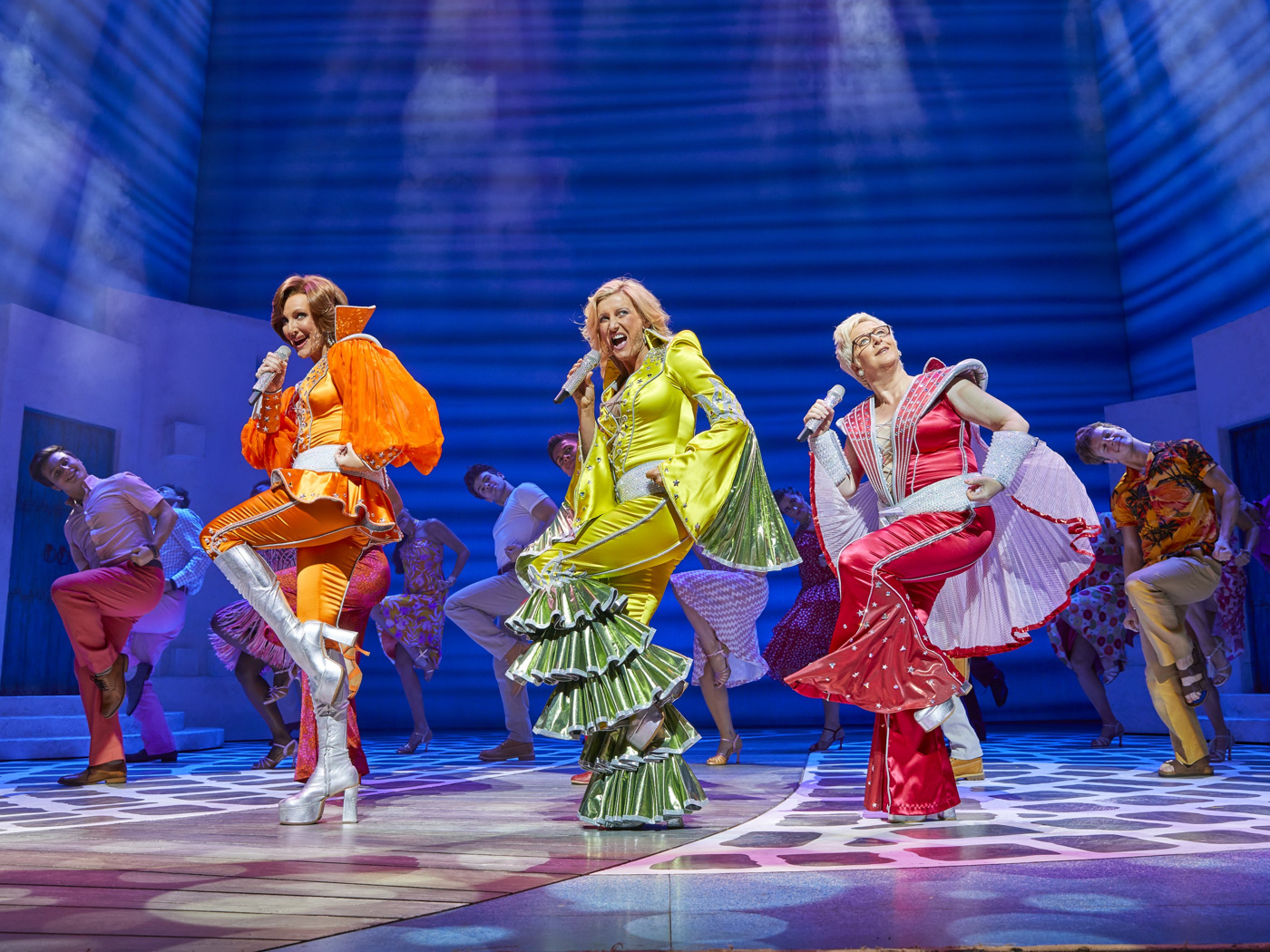Director Phyllida Lloyd on 20 Years of Mamma Mia! in London and Broadway's Upcoming Tina: The Tina Turner Musical

(Photo: courtesy of Amanda Malpass PR)
Mamma Mia! has transformed the lives of a lot of people, not least its gifted and versatile director, Phyllida Lloyd, who came to the ABBA musical from a career in the British not-for-profit sector and has gone on to direct the Tina Turner bio-musical that will open on Broadway in November. Fresh from a day spent prepping her next film, Herself, starring and co-written by the Irish actress Clare Dunne, the ever-engaging and expansive Lloyd spoke to Broadway.com about her biggest hit’s 20th anniversary in the West End and helping birth a genuine phenomenon.
How does it feel as you mark 20 years this month of Mamma Mia! on the West End stage? [The production, which premiered in April 1999 at the Prince Edward Theatre, is now humming along happily across town at the Novello, where it marked the occasion with a gala performance on April 6.]
It feels unimaginable, it really does. To think that any show one is involved in could have survived that long is both humbling and amazing. On the other hand, a lot of it feels like it all happened yesterday in terms of one’s memories of the details of it all and the extent to which none of us had any idea it was going to work. So, yes, it’s amazing that Mamma Mia! is not only just here [in London] but quite a few other places, as well!
Do you recall what made you say yes to the offer?
I suppose I had never chased a West End musical before because I was quite afraid of the potential poisoned chalice in terms of the extent to which they could be a Faustian pact, and I suppose I associated them, too, with a sort of impregnable patriarchy. So, it was very disarming to meet Judy [Craymer, the producer], who felt instantly like a kindred spirit, and also Catherine [Johnson, the book writer], whom I knew a tiny bit from the Bristol Old Vic [a major regional playhouse west of London], and the fact that here we all were about to be 40. The whole thing sounded kind of mad and interesting and had such a strong female drive, and I was immediately seduced by Judy herself.
Had you been an ABBA buff already?
I was only really subconsciously an ABBA fan. I’d sort of jumped from The Beatles to Led Zeppelin and then to Bowie without really having a particularly long sojourn with ABBA, so I rushed out and started with ABBA Gold [their 1992 greatest hits album]. As soon as I started listening, I suddenly realized that ABBA was really part of one’s musical DNA without one having faced up to that fact.
Given your heavyweight resume in opera and theater, did you face any snobbery at the time from colleagues?
Nobody was remotely snobbish. I think most people felt it’s all one thing if you’re a director whether you’re doing Wagner or ABBA: at one point, I was doing Wagner’s Ring cycle at the same time as Mamma Mia! and I thought, "Here are two different pieces about lost parents. It’s just that one lasts 17 hours and the other lasts 2 hours 40 minutes [laughs]." I’m going at both with exactly the same seriousness and rigor.

When did you first clock that the show might be a hit?
I realized straight away that it was going to sell tickets, but in some ways, I was on a different trajectory during previews to everyone else. The audience were going mental at the end and I was thinking, "There’s still something not right with this, and we’ve got three weeks of previews dramaturgically to fix it." A lot of it had to do with settling on a modest and humble beginning and facing up to the fact that we weren’t a big, blowsy Broadway musical and didn’t have to come on all guns blazing. That’s why we start right in with the plot and with Sophie sitting on a rock, so by the time her mother [Donna] and her friends come on stage, you know the story.
Were you at all apprehensive about opening Mamma Mia! up for the screen?
I think the thing about why the stage show works on screen, aside from having so many favorite actors and favorite songs, was that it is was set on location: it wasn’t Rent, say, set in a load of apartments, which can be hard to open up into a proper movie. Mamma Mia! was sort of bursting at the seams to be on location, and the combination of that with the actors that we managed to get to do it, along with the soundtrack, pretty much made it.
Were you not tempted to do the 2018 follow-up, starring Lily James— and Cher?
On the first film, there were times when Hollywood was trying to suggest this, that, or the other, but we all felt that we knew the show so well and the story and the audience in relation to the story that it gave me a lot of authority to be able to go, “Thank you, that’s so interesting, but it’s not going to be able to work.” That’s why I didn’t do the second film: I knew I would never have that sort of control again.
Are you amazed to this day that Meryl Streep came on board as star? [Lloyd and Streep worked together a second time on The Iron Lady, for which Streep won her third Oscar.]
What happened with Meryl was that Mamma Mia! was in rehearsal in New York at the time of 9/11 and was in fact the first show to open on Broadway after 9/11, and Meryl was looking for something to do with her teenage daughter and her friends who were all very preoccupied by the horrendous events. So, she stumbled on this ABBA musical at the Winter Garden and came to see it and she wrote us a letter, which we kept copies of until they withered and fell off the fridge magnets.
How did that lead to the film?
When Meryl’s agent rang her about the movie and said, “You’ve had a call about Mamma Mia!” Meryl said, “I AM Mamma Mia!” Judy and I then went to see her and it was sort of like, “When do we start”? I didn’t have to take her to the show to try and persuade her because she had already seen it very early on.
You’re returning to Broadway later this year with your ongoing London hit, Tina: The Tina Turner Musical, once again starring Olivier nominee Adrienne Warren in the title role: how does that compare to Mamma Mia!?
What’s fascinating is how similar Tina is in once again being an all-female team that in this case consists of the producer Tali Pelman, the writer Katori Hall, and myself. It feels quite amazing to me that I should have gone for 20 years without doing another musical, so to be approached by a second female team to do a second show with a woman at the center—not to mention this woman [i.e. Tina Turner]—is surreal, and I do feel very lucky. I suppose I felt after Mamma Mia! as if I was never going to have the same luck twice.

Have you had hosted Tina Turner herself at a performance of Mamma Mia!?
You know, I don’t think Tina has ever been to Mamma Mia! I think she should go the next time she comes to London; she’d enjoy it a lot!
After your decades-long immersion in this material, do you have a favorite ABBA song?
I absolutely loathe karaoke but several casts over the past 10 years or so have come back to my house and insisted we do karaoke on last night parties, or whatever, and I truly dread it, not least when you’ve got Cynthia Erivo or somebody like that in your cast. [Tony-winner Erivo performed in Lloyd’s acclaimed all-female Henry IV.]
Talk about daunting. So, what do you do then?
It would be churlish of me to sit in the corner and refuse to take part. So, when a gun is put to my head, I tend to do “Lay All Your Love on Me”: It’s not necessarily my favorite ABBA song, but it’s one I think I can do.
How do you feel—as now seems possible—about the prospect that Mamma Mia! may just outlive us all?
I think it's a wonderful piece that will go on being one into eternity. The story of "who am I?" is never going to tire.